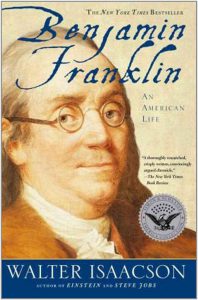 A very well documented chronicle.
A very well documented chronicle.
Before reading this book, I decided to read Franklin’s autobiography, and although it is beautifully written with a lot of details, I discovered all the gaps and reasoning behind his ideas after reading Benjamin Franklin: An American Life by Walter Isaacson.
I was inspired by the way Franklin created and guided his life. Challenging the status quo and designing his own way of living.
I believe it was a gift to humanity that he was an enthusiastic writer and documented his life.
Below are some of the ideas that caught my imagination from this book:
About God.
I believe He is pleased and delights in the happiness of those He has created; and since without virtue man can have no happiness in this world, I firmly believe He delights to see me virtuous
Franklin’s study of nature, he said, convinced him that God created the universe and was infinitely wise, good and powerful. He then explored four possibilities:
- God predetermined and predestined everything that happens, eliminating all possibility of free will.
- He left things to proceed according to natural laws and the free will of His creatures, and never interferes,
- He predestined some things and left some things to free will, but still never interferes.
- He sometimes interferes by His particular providence and sets aside the effects which would otherwise have been produced by any of the above causes.
Franklin ended up settling on the fourth option.
The Moral Perfection Project
The following list describes the twelve virtues Franklin thought desirable and wrote a short definition.
This is so interesting since he elaborates on concepts that, without mindfulness, we wouldn’t think about them; they would just be part of our lives, inherited from our family, culture, etc. – Instead, Franklin decides to define them and try to live his life accordingly.
Temperance: Eat not to dullness; drink not to elevation.
Silence: Speak not but what may benefit others or yourself; avoid trifling conversation.
Order: Let all your things have their places; let each part of your business have its time.
Resolution: Resolve to perform what you ought; perform without fail what you resolve.
Frugality: Make no expense but do good to others or yourself; (i.e waste nothing).
Industry: Lose no time; be always employed in something useful; cut off all unnecessary actions.
Sincerity: Use no hurtful deceit; think innocently and justly, and, if you speak, speak accordingly.
Justice: Wrong none by doing injuries, or omitting the benefits that are your duty.
Moderation: Avoid extremes; forbear resenting injuries so much as you think they deserve.
Cleanliness: Tolerate no uncleanliness in body, clothes, or habitation.
Tranquility: Be not disturbed at trifles, or at accidents common or unavoidable.
Chastity: Rarely use venery but for health or offspring, never to dullness, weakness, or the injury of your own or another’s peace or reputation.